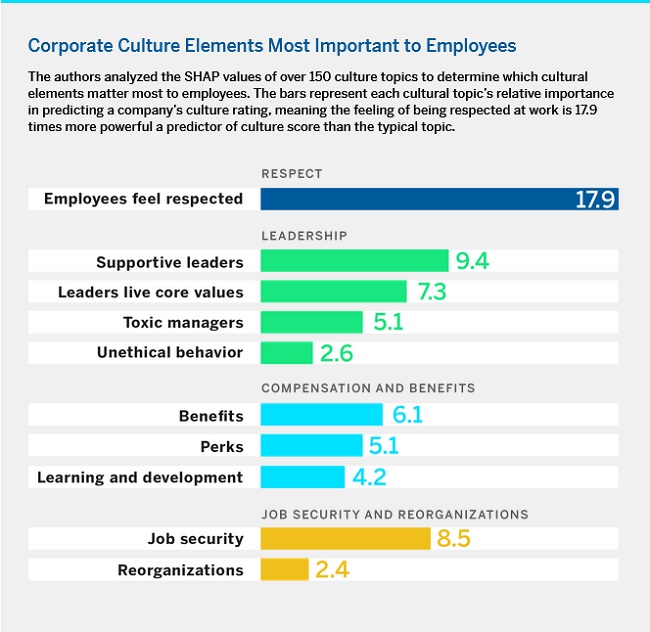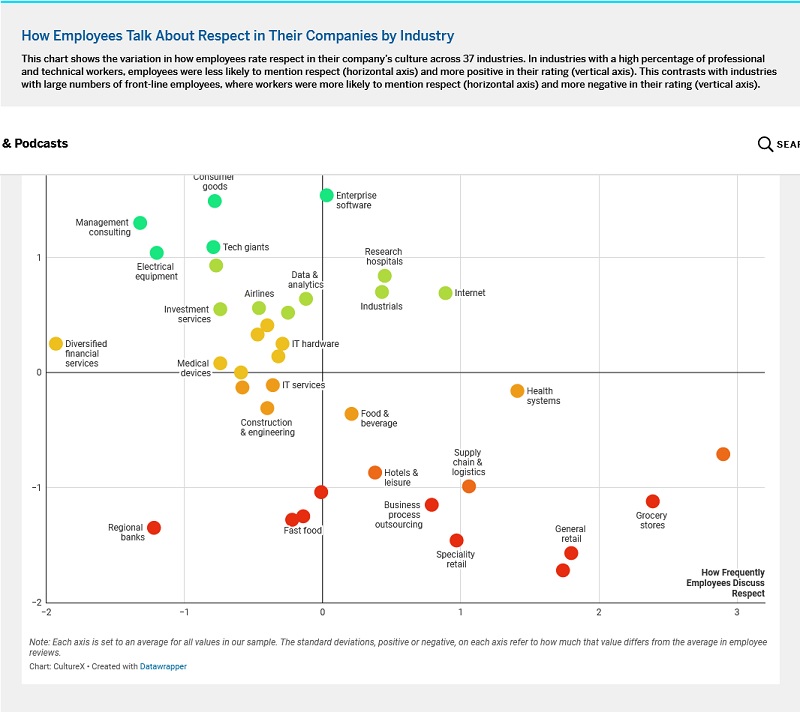Common Management Errors (3 cont. a)
Important Elements Of Corporate Culture
Introduction
Understanding what elements of culture are important to staff can help an organisation foster engagement, retain and/or attract staff, ie
"...nearly 2/3 of employees listed corporate culture among the most important reasons they stay with their current employee - or start looking for another job......Culture is the single best predictor of employee satisfaction, ahead of compensation and work-life balance..."
Donald Sull et al, 2021
There are divergent views about what elements of culture are most important. One study of organisations has identified 60 distinct values.
Generally,
"...An organisation's official core values signal top executives' cultural aspirations, rather than reflecting the elements of corporate culture that matter most to employees..."
Donald Sull et al, 2021
Ten most important themes or elements of culture for staff (see diagram below)
1. Employees feel respected (by far the single most important factor, ie employees want to be treated with consideration, courtesy, and dignity; their perspectives, needs, etc to be taken seriously;
"...Respect is nearly 18 times as important as the typical feature......in predicting a company's overall culture rating and almost twice as important as the second most predictive factor..."
Donald Sull et al, 2021
"...The strong and varied language employees used to describe disrespect suggest how deeply it affects them. Employees describe being demeaned and degraded, viewed as disposable cogs in a wheel or robots, or treated like children, second-class citizens, crap, garbage, dirt, trash, scums, idiots or cattle..."
Donald Sull et al, 2021
In looking at different industries, generally respect was less of an issue in professional and technical organisations such as management consulting, software development, etc. While industries with large numbers of front-line employees, like restaurants, retailers, etc, respect, or rather lack of it, was more of an issue.)
2. Supportive managers*i, especially top management (managers help employees do their work; respond to requests; accommodate employees' individual needs; offer encouragement; are supportive, ie 'cover their backs'; top management is more important than staff's immediate boss, ie
"...Top leadership......twice as important as......employee's immediate boss..."
Donald Sull et al, 2021
Top management members are responsible for several matters that are important to staff, eg renumeration, benefits, learning and development opportunities, job security, reorganisation, organisational direction, etc)
3. Management lives core values*i (managers' actions are consistent with the organisation's values, ie 'walk the talk' or 'practise what they preach'; staff have a healthy cynicism about management's role modelling of core values, ie if 'managers pay lip service to core values' or 'a wide gap exists between cultural rhetoric and reality', it is very visible to employees, ie
"...Employees don't expect leaders to live the core values, but they appreciate it when they do..."
Donald Sull et al, 2021)
4. Toxic managers*i (managers who create a toxic work environment are described in extremely negative terms; description of toxic managers includes abusive, disrespectful, non-inclusive, unethical, etc)
5. Unethical behaviour*i (management and staff lack integrity and act in an unethical manner; most organisations list integrity or ethics as among their core values; ethical behaviour is a top predictor of organisation's culture rating; unethical managers are bad role models for the rest of staff)
6. Benefits*ii (staff's assessment of all provided benefits; benefits are considerably more important than compensation and their importance can vary depending upon the job, eg
"...Health-insurance and benefits are better......for front-line workers, while retirement benefits......for white-collar employees..."
Donald Sull et al, 2021
Compensation is still an important issue for retaining employees, especially younger workers)
7. Perks*ii (staff's assessment of workplace amenities and perks; the important one is 'free' coffee; some others include on-site meals, free wine, social events (happy hour, picnics, etc), teambuilding exercises, etc)
8. Learning and development*ii (staff's assessment of opportunities for formal and informal learning like helping with college tuition, mentoring/executive coaching, etc; learning and development is more important for white-collar workers than for front-line employees)
9. Job security (perceived job insecurity and instability including concerns of layoffs, outsourcing, sackings, automation, etc)
10. Reorganisation (staff's view of organisational change including frequency and quality; many negative descriptions, ie too fast, inconsistent strategy, lack of clarity, etc)
Notes
i) these come under a general heading of leadership
ii) these come under a general heading of compensation and benefits
NB It is of interest to note that topics
"...like friendly colleagues, flexible schedules, and manageable workloads were commonly discussed but had little or no impact on the company's overall culture score..."
Donald Sull et al, 2021
In summary
Organisations need to have the right, healthy culture to be able to retain good staff, attract quality recruits, maintain employee engagement, etc

(source: Donald Sull et al, 2021)

(source: Donald Sull et al, 2021)
